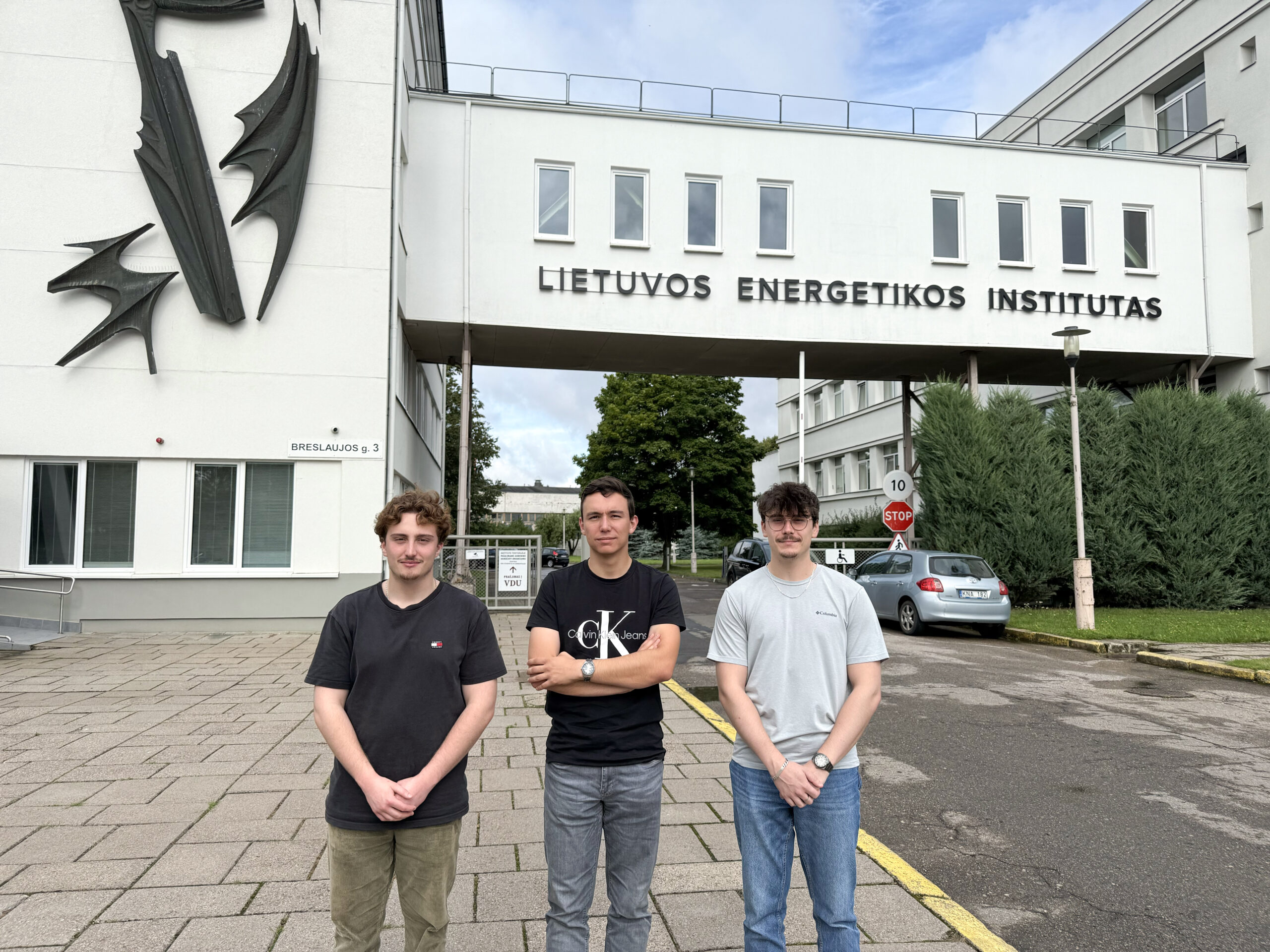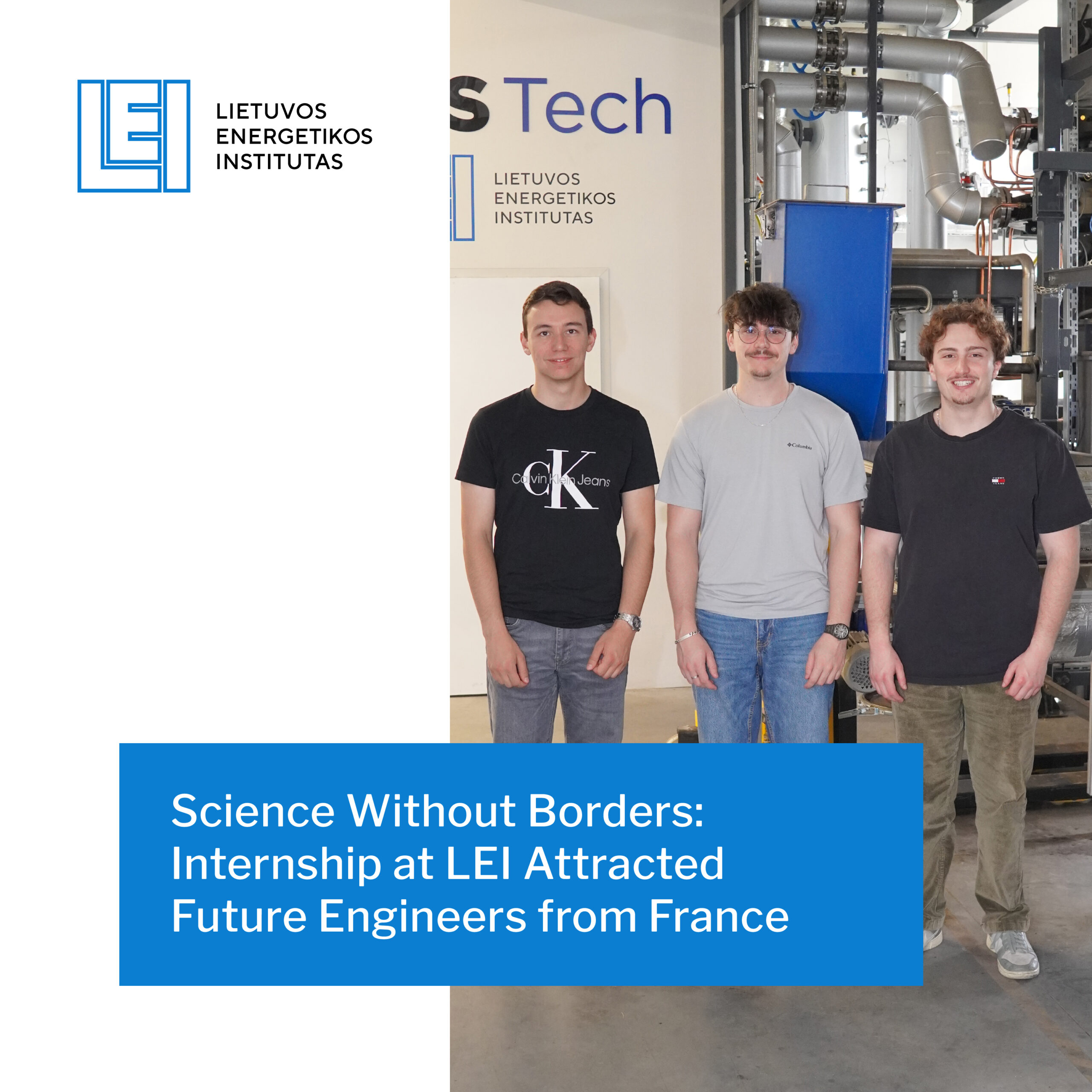This summer, three master’s students from France — Arnaud Duchâteau, Tony Alloza, and Guillaume Ardi — are doing internships at the Laboratory of Combustion Processes of the Lithuanian Energy Institute (LEI). They came to Lithuania to gain international experience and to get closer insight into scientific research in the field of energy.
Different Universities – Common Direction
Arnaud Duchâteau and Guillaume Ardi study energy engineering at Polytech Orléans, specializing in aerospace technologies. Meanwhile, Tony Alloza is a chemical engineering student at the National Graduate School of Chemical, Materials and Process Engineering (Toulouse INP-ENSIACET).
“My studies require a three-month internship abroad. I wanted to do it in Eastern Europe — I was interested in Lithuania and Poland, and while browsing online, I found the LEI Combustion Processes Laboratory. I knew that last year the lab had already hosted an intern from France, so I decided to try myself,” says T. Alloza, who started his internship in June.
A. Duchâteau and G. Ardi arrived in Lithuania at the beginning of the year as Erasmus+ program students. They studied for one semester at Vilnius TECH University and started their internship at LEI after completing the semester.
“We wanted to get to know Eastern Europe, as this is a region hardly known in France. This experience helped us not only deepen our academic knowledge and practical skills but also get acquainted with a new culture, people, daily life, and a different scientific and work environment. It was both an academic and personal experience we will remember,” says A. Duchâteau.
G. Ardi revealed that their decision to come to Lithuania was influenced not only by the desire to discover a new country but also by recommendations from acquaintances.
“Arnaud and I know a French student who did an internship at LEI last year — he studies at our university but is a year older. The former LEI intern shared his positive experience, which encouraged us to choose this institute as well. Also, we wanted to do the internship near Vilnius, where we studied for half a year, so we could coordinate our final exams and the internship. LEI seemed like a great opportunity,” he explains.

Experiencing Laboratory Life
During the internship, the students contribute to two different projects. One of them is “Sustainable Glass Industry with Fuel-Flexible Technology” (GIFFT), which aims to replace fossil fuels used in glass melting processes with alternative, low-carbon energy sources. The second project, “Investigation of thermal radiation enhancement from alternative fuel flames in industrial furnaces” (RAD2FUN), involves plasma-assisted combustion of ammonia and other alternative fuels. Initially, the interns reviewed scientific literature and then moved on to practical experiments related to combustion processes and plasma parameters.
“We conducted experiments with ammonia, CO₂, and methane, adjusting plasma frequency and voltage to study and understand the combustion processes in more detail. We worked with various experimental equipment — sensitive sensors, a specialized camera capturing combustion development, and analytical software for processing the collected data. It was not only interesting but also a very valuable experience,” revealed A. Duchâteau.
T. Alloza is glad that the lab work allowed him to apply the knowledge he gained during his chemical engineering studies. “Fundamentals of analytical chemistry, physics knowledge, and the ability to analyze data proved especially useful. I had never worked in a research laboratory before, so this experience was extremely valuable — both for professional development and my planned career in industry,” he says.
Business or Science?
The internship at LEI prompted the students to rethink their future plans. G. Ardi admitted that he previously planned not to continue his studies but is now considering pursuing a PhD. He was impressed by the world of scientific research, lab work, experiments, and data analysis.
Working in the lab left a positive impression on A. Duchâteau as well — he is considering continuing a scientific career. However, he admits that it is difficult in France to find a PhD topic that matches both personal interests and financial possibilities. So, at the moment, he is still weighing his options — he would like to work in a lab, but practical considerations will influence his decision.
T. Alloza already works as an engineer at a paper mill in France and plans to continue his industrial career after graduation. Nevertheless, he regards the LEI internship as a valuable and unique experience.
“Not many have the opportunity to work in a high-level scientific laboratory, especially abroad. I learned a lot — this is a significant experience that will help me in the future, no matter which path I choose,” he confidently states.
Recommendations to Others
The interns are pleased with the internship conditions at LEI and their time spent in Lithuania. According to T. Alloza, both the institute’s staff and the people they met outside were kind and always ready to help, so the students never felt alone.
“LEI left a great impression due to its modern laboratories, conferences we attended during the internship, and sincere attention to students. We had the opportunity to grow both professionally and personally,” says T. Alloza.
The students were especially impressed by the scale and infrastructure of the institute. During the internship, they visited not only the lab where they worked but also other scientific subdivisions, learned about various research directions, and saw technical equipment.
“It was impressive not only because of the LEI environment itself but also the constant support — the internship supervisors always made time to answer our questions, explained processes, and made sure we got the most out of this experience,” the interns emphasize.
They recommend LEI to other students who are considering internships abroad. According to interns, it is a great opportunity to gain international experience, improve English language skills, and get acquainted with a professional laboratory environment and research culture.
“Moreover, Lithuania is a very interesting country full of contrasts. Here you can not only see a lot but also experience it — both culturally and socially. Travel between cities is fast and affordable, so in our free time, we had the chance to visit various places — from vibrant cities to peaceful nature. This truly enriched our time here,” says A. Duchâteau.






